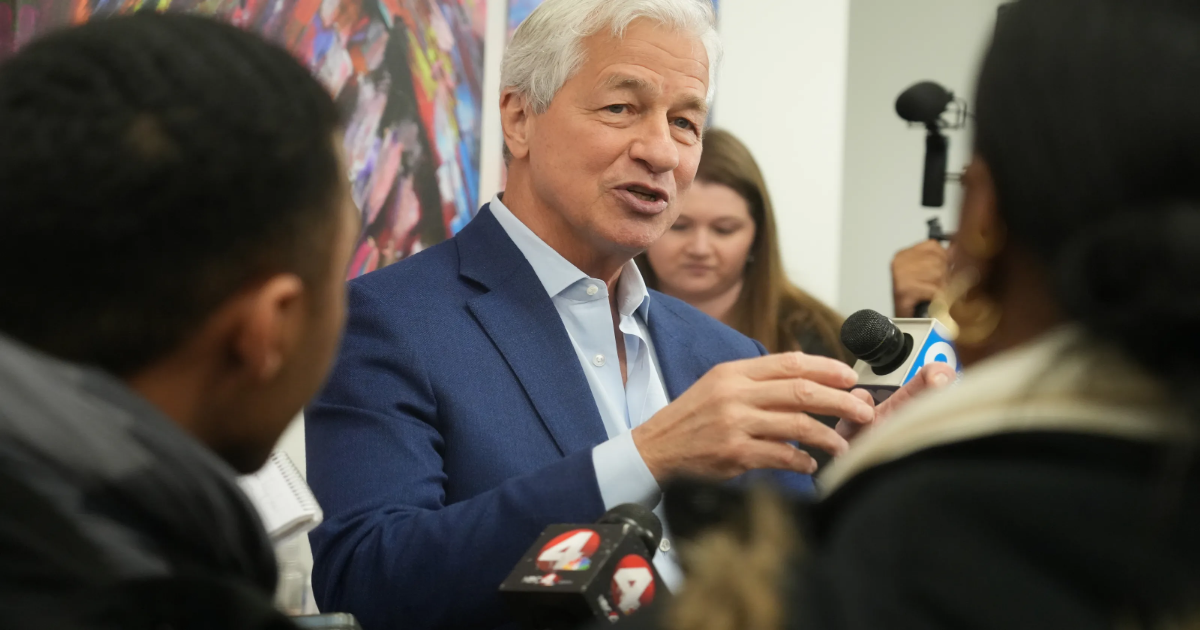
- JPMorgan Chase CEO Jamie Dimon warns that tariffs imposed by the Trump administration increase the likelihood of a recession.
- While acknowledging the need for change, Dimon cautions against overcorrection in response to past and current policies.
- Dimon reiterated his stance on the importance of returning to the office.
The trade war launched by President Donald Trump’s tariffs make a recession more likely, JPMorganChase’s top leader warned in his annual letter to shareholders Monday.
Trump last week announced a baseline 10% tariff and higher rates on other countries that have large trade surpluses with the United States. The latest tariffs sparked a downtown in the stock market last week that appeared continued Monday.
In his letter, Dimon warns that such moves could harm the American economy.
“The recent tariffs will likely increase inflation and are causing many to consider a greater probability of a recession,” Dimon said. “And even with the recent decline in market values, prices remain relatively high.”
Related Jamie Dimon article: JPMorgan Chase CEO Jamie Dimon talks Trump, tariffs, DEI and remote work at Columbus event
Regardless of whether a full-on recession occurs, Dimon wrote that tariffs will inevitably slow growth in the economy. The bank, which is Columbus’ largest employer, remains cautious in 2025, Dimon wrote.
Despite the looming economic threat of tariffs, Dimon wrote that Chase ended 2024 on a financial high note.
In 2024, the bank earned revenue of $180.6 billion and net income of $58.5 billion. Chase also increased its quarterly common dividend of $1.05 per share to $1.15 per share in the first quarter of 2024 and again to $1.25, according to Dimon’s letter.
In his letter, Dimon also called for an end to culture wars that have plagued politics for the last several years.
Too often, he wrote, Americans engage in class warfare and identity politics. Government has implemented too many ineffective policies to combat climate change that have actually increased the cost of living, he wrote.
While Dimon acknowledged that changes are needed, he wrote that he fears there could be an overcorrection to past and current policies.
“Unfortunately, more and more people are being disrespectful, condescending and unwilling to listen to one another,” he wrote. “When all is said and done, let’s hope we can all treat each other with a little more respect.”
Return to office mandate
Although Dimon has long been a critic of work-from-home policies, he only briefly mentioned Chase’s return to office mandate in his annual letter.
In February, Dimon said that Chase employs more than 20,000 workers locally. The bank’s Columbus headquarters is located at Polaris.
The bank recently announced it was ordering its employees back to the office five days a week. Dimon has said working from home all the time stifles creativity and hampers new, younger employees who aren’t interacting with coworkers with more experience and who are missing out on the kind of collaboration and mentorship that takes place when people are working in the same building.
Despite his reasoning for a return to the office, Dimon came under fire in February when he told employees at a town hall in Columbus not to bother with a petition against returning full-time in person, Reuters reported. Dimon told workers that he didn’t “care how many people sign that (expletive) petition.”
In his annual letter, he was far more subtle about the mandate:
“We need to believe in ourselves and get back to work (in the office!)” he wrote to shareholders.
Dispatch investigative reporter Max Filby can be reached by email at [email protected]. Find him on X at the handle @MaxFilby or on Facebook at @ReporterMaxFilby.
